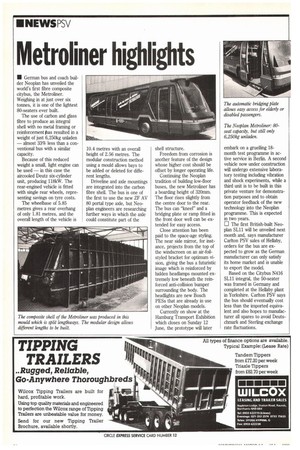Metroliner highlights
Page 18

If you've noticed an error in this article please click here to report it so we can fix it.
IN German bus and coach builder Neoplan has unveiled the world's first fibre composite citybus, the Metroliner. Weighing in at just over six tonnes, it is one of the lightest 80-seaters ever built.
The use of carbon and glass fibre to produce an integral shell with no metal framing or reinforcement as resulted in a weight of just 6,250kg unladen — almost 33% less than a conventional bus with a similar capacity.
Because of this reduced weight a small, light engine can be used — in this case the aircooled Deutz six-cylinder unit, producing 118kW. The rear-engined vehicle is fitted with single rear wheels, representing savings on tyre costs.
The wheelbase of 5.85 metres gives a rear overhang of only 1.81 metres, and the overall length of the vehicle is 10.4 metres with an overall height of 2.56 metres. The modular construction method using a mould allows bays to be added or deleted for different lengths.
Driveline and axle mountings are integrated into the carbon fibre shell. The bus is one of the first to use the new ZF AV 80 portal type aide, but Neoplan engineers are researching further ways in which the axle could constitute part of the shell structure, Freedom from corrosion is another feature of the design whose higher cost should be offset by longer operating life.
Continuing the Neoplan tradition of building low-floor buses, the new Metroliner has a boarding height of 320mm. The floor rises slightly from the centre door to the rear. The bus can "kneel" and a bridging plate or ramp fitted in the front door well can be extended for easy access.
Close attention has been paid to the space-age styling. The near side mirror, for instance, projects from the top of the windscreen on an air-foilstyled bracket for optimum vision, giving the bus a futuristic image which is reinforced by hidden headlamps mounted extremely low beneath the reinforced anti-collision bumper surrounding the body. The headlights are new Bosch PESs that are already in use on other Neoplan models.
Currently on show at the Hamburg Transport Exhibition which closes on Sunday 12 June, the prototype will later embark on a gruelling 18month test programme in active service in Berlin. A second vehicle now under construction will undergo extensive laboratory testing including vibration and shock experiments, while a third unit is to be built in this private venture for demonstration purposes and to obtain operator feedback of the new technology into the Neoplan programme. This is expected in two years.
0 The first British-built Neoplan SL11 will be unveiled next month and, says manufacturer Carlton PSV sales of Hellaby, orders for the bus are expected to grow as the German manufacturer can only satisfy its home market and is unable to export the model.
Based on the Citybus N416 SL11 integral, the 50-seater was framed in Germany and completed at the Hellaby plant in Yorkshire. Carlton PSV says the bus should eventually cost less than the imported equivalent and also hopes to manufacturer all spares to avoid Deutschmark and Sterling exchange rate fluctuations.
















































































































